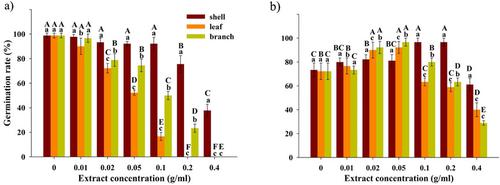当前位置:
X-MOL 学术
›
Chem. Biodivers.
›
论文详情
Our official English website, www.x-mol.net, welcomes your
feedback! (Note: you will need to create a separate account there.)
Allelopathic Effects of Castanea henryi Aqueous Extracts on the Growth and Physiology of Brassica pekinensis and Zea mays
Chemistry & Biodiversity ( IF 2.3 ) Pub Date : 2020-05-07 , DOI: 10.1002/cbdv.202000135 Yue Ming 1, 2 , Guan-Xing Hu 1, 2 , Jing Li 1, 2 , Zhou-Jun Zhu 1, 2 , Xiao-Ming Fan 1, 2 , De-Yi Yuan 1, 2
Chemistry & Biodiversity ( IF 2.3 ) Pub Date : 2020-05-07 , DOI: 10.1002/cbdv.202000135 Yue Ming 1, 2 , Guan-Xing Hu 1, 2 , Jing Li 1, 2 , Zhou-Jun Zhu 1, 2 , Xiao-Ming Fan 1, 2 , De-Yi Yuan 1, 2
Affiliation

|
The present study investigated the allelopathic effects of aqueous extracts of Castanea henryi litter on the growth and physiological responses of Brassica pekinensis and Zea mays. Treatment with high concentrations of leaf extract (0.05 g/ml for B. pekinensis and 0.10 g/ml for Z. mays) significantly increased malonaldehyde content and reduced seed germination, seedling growth, chlorophyll content, and the activity levels of antioxidant enzymes. These effects generally increased with increasing extract concentration. However, in Z. mays, low extract concentrations actually promoted seed germination, shoot growth, chlorophyll content, and antioxidant enzyme activity. The allelopathic effects of the various C. henryi extracts decreased as follows: leaf extract > twig extract > shell extract. Eleven potential allelochemicals including rutin, quercetin, luteolin, procyanidin A2, kaempferol, allantoin, propionic acid, salicylic acid, jasmonic acid, methylmalonic acid, and gentisic acid were identified in the leaves of C. henryi which were linked to the strongest allelopathic effects. These findings suggest that the allelopathic effects of C. henryi differ depending on receptor plant species, and that leaves are the most allelopathic litter in C. henryi.
更新日期:2020-05-07











































 京公网安备 11010802027423号
京公网安备 11010802027423号